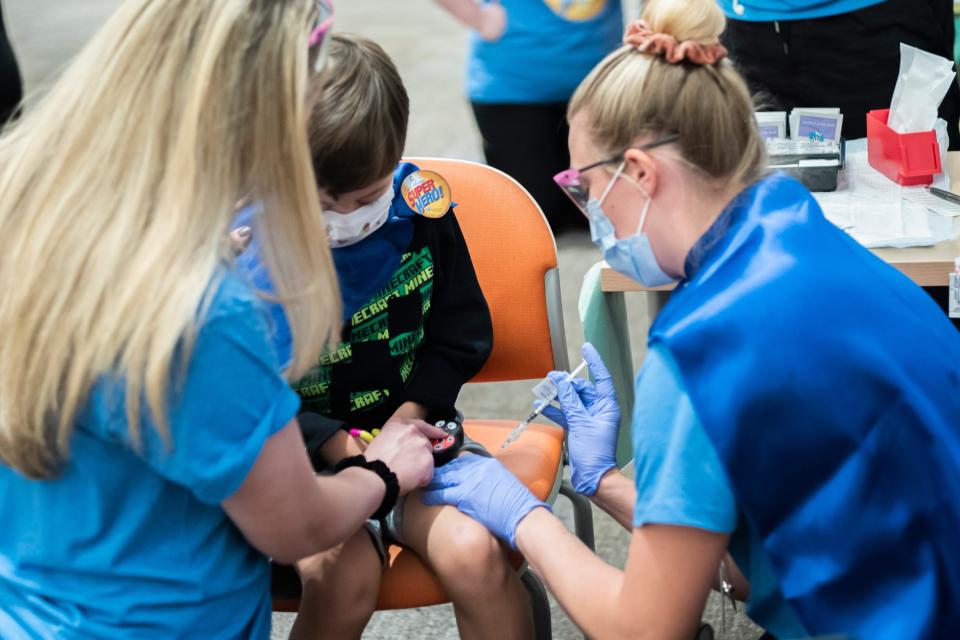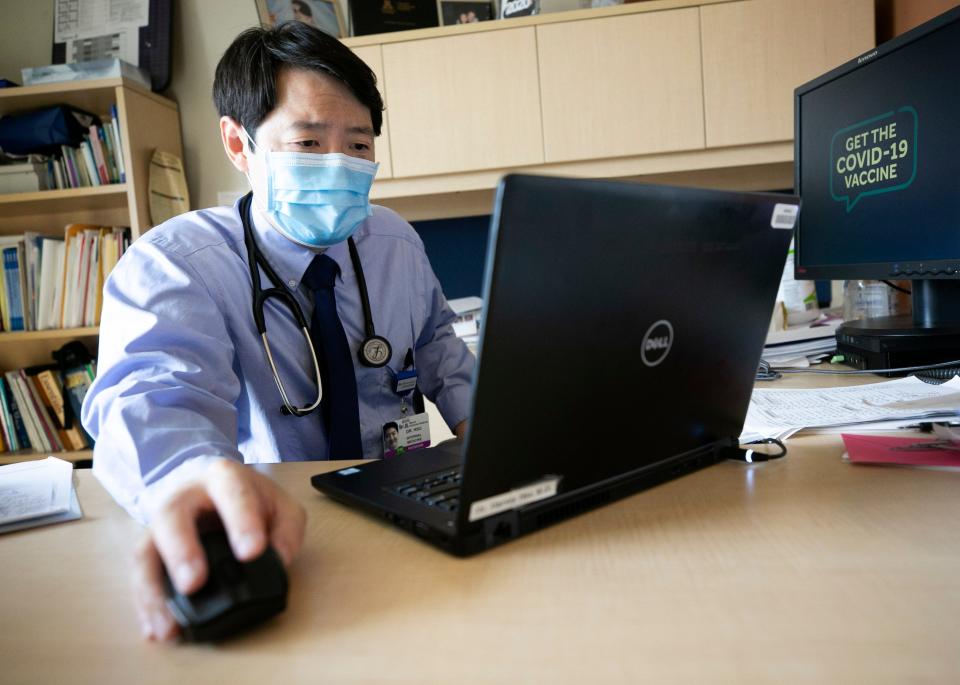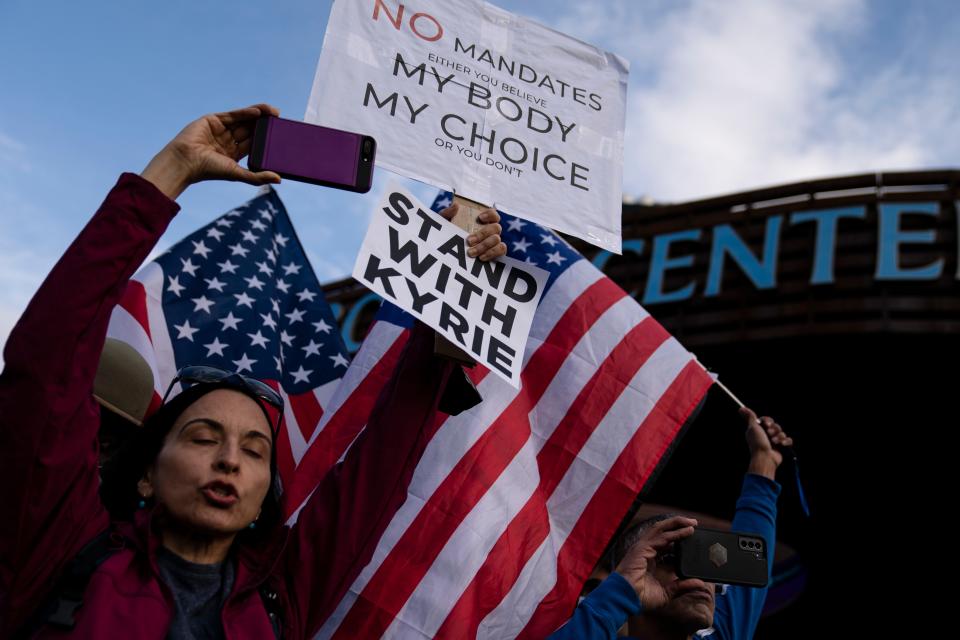Hospitals face staffing shortages, employee clashes as COVID-19 vaccine mandate looms
DENVER — For months, Kathy Howell heard grumbling from her fellow nurses and doctors as COVID-19 vaccines became widely available — and a small number of their colleagues refused to get one.
"Members of our staff were saying, 'I can't believe I work with people who won't get vaccinated,'" Howell said. "Their colleagues were not happy with them. There definitely were a lot of feelings."
Those feelings may start getting even more pointed following the Biden administration's recent announcement that about 17 million healthcare workers must be fully vaccinated by Jan. 4. And experts across the country worry that forcing the nation's already-stressed 76,000 hospitals, health care clinics and nursing homes to implement vaccine mandates may push critically needed workers to quit as tensions between vaccinated and unvaccinated workers grow.
Of particular concern are rural healthcare facilities already grappling with severe staffing shortages and a proportionally larger number of hesitant workers.
Experts say vaccine mandates are necessary because unvaccinated healthcare workers can get patients sick. This spring, two residents of a Kentucky nursing home died after getting COVID-19, even though 90% of their fellow residents had been vaccinated. The source of the infection? Their caregivers, half of whom were unvaccinated, according to federal officials.
"In short, the low vaccination rate of the healthcare workers supplied the kindling for the outbreak," concluded the Covid States Project, a multi-university group of computer scientists, public health experts and political science specialists studying how people's behavior affects virus transmission. "The question going forward is to what extent might this occur in other healthcare settings around the country."

David Lazer, a professor at Northeastern University in Massachusetts who helps lead the Covid States Project, said the research has raised an interesting question: "Do you as a patient have the right to demand an all-vaccinated location? Because nobody wants to go to a restaurant and get infected -- and curing people is not part of their core mission. In health care, it's particularly material to your mission."
Hospitals worried about losing more staff
Nancy Foster, the American Hospital Association's vice president of quality and patient safety policy, said the potential loss of staff has been a regular topic of conversation among hospital and health care administrators.
The association developed best practices to share vaccine information with workers, including custodial or housekeeping staff with limited English skills.
Today, about 77% of healthcare workers have been vaccinated. Healthcare workers closest to COVID-19 patients are the ones most likely to have gotten vaccinated voluntarily, and they've been butting heads with unvaccinated colleagues, Foster said.

"They have touched that part of the elephant and are very pro-vaccine as a result," she said. "It is in some regards creating tension in the workplace, in what was already a stressed environment."
Many large healthcare systems and other facilities in urban areas have already mandated vaccines, taking advantage of the fact that urban Americans were more likely to voluntarily get vaccinated than their rural counterparts.
That's what happened at Howell's employer, the University of Colorado Health System, Colorado's largest: Although the state set an Oct. 31 vaccination deadline, UC Health mandated its own Oct. 1 deadline, and then fired 119 people who refused to comply with the policy.

That decision followed months of personalized conversations with vaccine-hesitant workers, some of whom spoke English as a second language. Howell said most of the workers who received the specialized briefings ultimately got vaccinated.
"We've tried to talk. We've tried to lead with facts. And there are some people who wouldn't change their minds. So we just stopped the conversation," said Howell, who leads UC Health's 8,600-person nursing department as its chief nursing executive. "We already have to be vaccinated for so many things, and it's been that way my entire career."
The 119 people let go by UC Health represent about 0.5% of the system's overall workers, and Howell said the system was able to adjust to their loss relatively easily.
Vaccinated workers unhappy with coworkers who won't get shot
North of Colorado in Wyoming, where there are yet no vaccine mandates, voluntarily vaccinated healthcare workers are increasingly pushing hospital supervisors to force unvaccinated workers to either quit or get the shots, said Tim Thornell, president and CEO of Cheyenne Regional Health System, the state's largest healthcare system. He said he's offered $600 bonuses or time off to encourage the approximately 20% of his staff that's unvaccinated to change their minds.
He said his health care system can ill afford to lose any staff, and worries what will happen if large numbers of unvaccinated workers quit. But he also worries about what will happen if vaccinated workers get so mad at their colleagues that they quit instead.
"We're now crossing that bridge where we are hearing more from vaccinated staff who are thinking about leaving for a safer environment," Thornell said.
Already, hospitals and other care facilities around the country have been forced to temporarily shutter certain specialized units after unvaccinated workers quit rather than comply with mandates, and rural health care experts predict the loss of even a handful of workers at small facilities will affect patient care.
That's because the country's rural health care was already ailing before the pandemic began, and the grinding hours, frantic rescue efforts and ongoing deaths have already prompted workers to quit.

About 99% of nursing homes and 96% of assisted living facilities are facing staffing shortages, and virtually all said they were having a hard time hiring. In rural areas where nursing assistants might earn only $15-16 an hour for physically hard work moving and managing patients, fast-food jobs offering the same pay are quickly becoming more attractive.
Another study found the nation could be short 510,394 registered nurses by 2030 and a summer survey by the American Nurses Foundation found that the biggest reason nurses were considering quitting their jobs was a lack of staffing.
"In the midst of all this you've got a severe workforce shortage, and all this dissension and disagreement is causing gaps in care," said Brock Slabach, COO of the National Rural Health Association. "You add on top the vaccine mandate and that could be a knockout punch for many rural hospitals."
Vaccine mandates were 'almost inevitable'
Slabach said rural healthcare workers have traditionally been less willing to get vaccinated, a reflection of the sentiments of the communities in which they live and work.
Lazer of the Covid States Project said the research shows that while a minority of people are vocally opposed to vaccines and to mandates, the majority of Americans support both. He said research also shows that mandates are effective in prompting people to get vaccinated. He said it's unsurprising healthcare workers are growing increasingly agitated that a small minority of their colleagues refuse to get vaccinated until forced to.
"It is ironic but not surprising that the people who don't want to do something end up doing it when they're ordered to do it," he said. "It was almost inevitable that was going to be the rough sequence of the policy movement."
Back in Denver, Howell said UC Health worried about losing workers to the mandate, but it was the right decision to protect both patients and staff. She said there were also some vaccine-hesitant workers who just didn't believe administrators would follow through with consequences.
"They were trying to see if we would call their bluff. We did," she said. "And a lot of them got vaccinated."
This article originally appeared on USA TODAY: Biden vaccine mandate raises healthcare worker loss fears

 Yahoo Autos
Yahoo Autos 